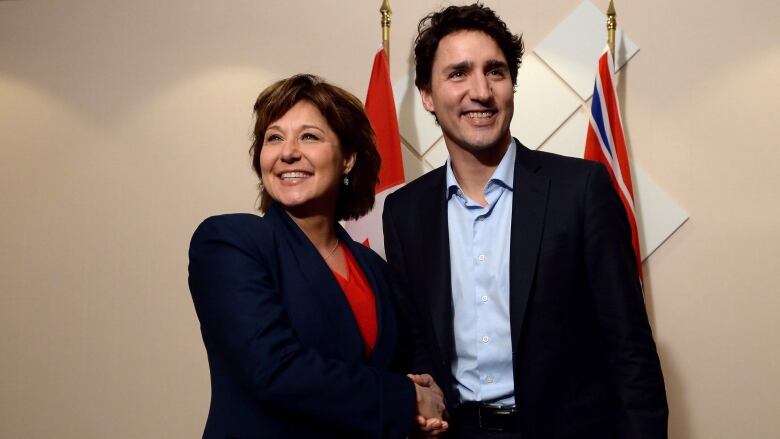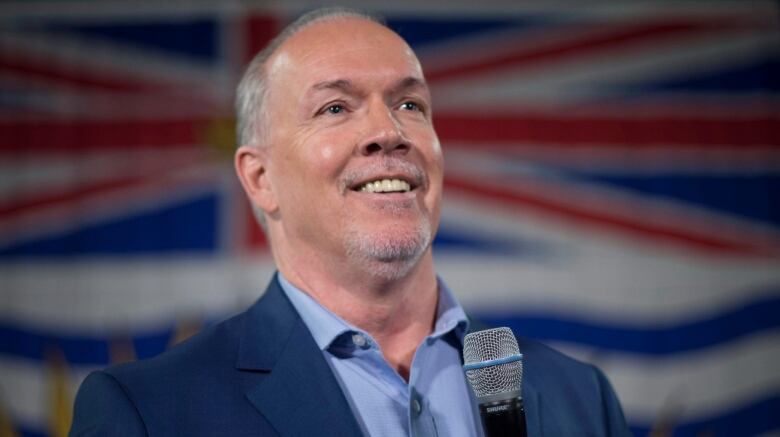How the B.C. election could impact federal parties
British Columbians go to the polls on May 9 and federal parties might be watching with mixed emotions

If you're a Conservative in British Columbia, you'll probably find yourself voting Liberal when the province goes to the polls on May 9. If you're a Liberal, there's a decent chance you'll cast a ballot for the NDP. And if you're a New Democrat, you might be rooting against the only governing New Democrat in the country, Alberta Premier RachelNotley.
B.C. politics are complicated.
And those complications might extend all the way to Ottawa when the results of next month's provincialelection are known.
- B.C. Poll Tracker: Follow the latest projections
- NDP kicks off B.C. campaign with lead and uncertain future
A Venn diagram would be needed to properly explain the overlap between the provincial B.C. parties and their federal counterparts. The B.C. Liberals, a centre-right coalition that includes both federal Conservatives and Liberals, is not affiliated with Justin Trudeau's Liberal Party.
The B.C. New Democrats, under John Horgan, are affiliated with their federal counterpart, as are all provincial iterations of the NDP. But the provincial NDP routinely out-performs the federal NDP in British Columbiabecause the provincial party is supported by a large number of voters who cast their ballots for the federal Liberals.
A recent Insights West poll laid it all out. It found that 88 per cent of British Columbians who voted for the federal New Democrats in 2015 now support the B.C. NDP, while 73 per cent of 2015 Conservative voters are supporting the B.C. Liberals.
But those who voted for the federal Liberals were split: 49 per cent support the B.C. Liberals and 34 per cent support the B.C. NDP.
Divided loyalties and priorities
The B.C. Liberals are backed by federal Conservatives both in B.C. and in Ottawa. Though there is a B.C. Conservative Party in the province, it took just 4.8 per cent of the vote in 2013 and as of Tuesday afternoon had just eight candidates running in B.C.'s 87 ridings.
The pipeline policies of Christy Clark, who has been premier since 2011, are unlikely to displease many Conservatives the B.C. Liberal leader is in favour of building pipelines like Kinder Morgan's Trans Mountain project, which the federal Liberals approved last fall and which runs from Alberta to Burnaby, B.C.
That decision, however, has divided some federal Liberals. The party took a hit in the polls in B.C. immediately after the decision was announced and some Liberal MPs from British Columbia expressed concerns.
Liberal voters disillusioned by the pipeline approvalmight now be considering casting a ballot for the B.C. New Democrats, who are opposed to Trans Mountain.
But for that reason, the Liberal government in Ottawa would likely prefer Clark's re-election. Trudeau has staked his party's reputation in Western Canada on its ability to get pipelines built. An NDP victory in British Columbiacould complicate that.
New Democratvs. New Democrat
It could also complicate matters for the federal New Democrats. The party has alreadystruggled with balancing the competing interests of Notley's Alberta government and the federal party's own environmentalist wing a struggle that contributed to Tom Mulcair's lostNDP leadership vote atthe party's Edmonton convention last year.
Matters could come to a head if Horgan becomes premier and finds himself at odds with the only other NDP premier in Canada over pipelines. And the candidates in the running for the federal NDP leadership may be forced to take sides.

Already, pipelines have proven to be one of the few issues dividing the current field of four candidates, with Peter Julian and Niki Ashton echoing Horgan's position and Guy Caron and Charlie Angus admiring Notley's approach.
Nevertheless, the federal NDP ishoping for a win in British Columbia. After provincial defeats in Manitoba and Saskatchewan last year and the party's disappointing showing in the 2015 federal election, New Democrats need a win.
A defeat for the B.C. NDP could defuse apotentially awkward stand-off between Alberta and B.C., but yet another loss could raise urgent questions the leadership contestants will have to answer especially if the B.C. Greens contribute to such a defeat.
GreenParty sees growing support
Support for the B.C. Green Party has been growing in the run-up to the election campaign, increasing by six points in a little more than a month.
A Green breakthrough would give the stagnating federal party a much-needed boost though Elizabeth May got herself elected to the House of Commons in 2011 and re-elected in 2015, the party's nationwide support fell to 3.4 per cent. That was its worst performance since 2000, when the party did not run a full slate of candidates.
An NDP defeat in B.C. due to increased support for the Greens could make the case for a more environmentalist NDP at the federal level and potentially widenthe divide between the Alberta New Democrats and their cousins in Ottawa.
Renewed support for the Greens could also eat into the federal Liberals' vote.
So the repercussions of British Columbia's provincial election could be widely felt. The Liberals might want to see Clarkre-elected in order to get pipelines built, despite its potential for hurting them in the province later on. Win or lose, the New Democrats will have some problems to tackleafter May 9.
That leaves the conservativeswith few competing interests or complications coming out of the B.C. election though it means they still have torootfor a Liberal.












_(720p).jpg)


 OFFICIAL HD MUSIC VIDEO.jpg)
.jpg)



























































































